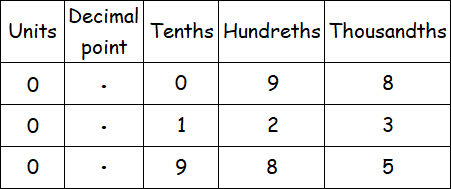ORDERING INTEGERS FRACTIONS AND DECIMALS
Subscribe to our ▶️ YouTube channel 🔴 for the latest videos, updates, and tips.
Ordering Integers
To order the integers, we have to locate the given integers on the number line and mark them. Then, write the integers from left to right to list them in order from least to greatest.
Let us look at an example to understand this.
Example 1 :
Order the integers -2, -5, 4, 0, -3, -1, 3 from least to greatest.
Solution :
Let us locate the integers -2, -5, 4, 0, -3, -1, 3 on a number line and mark them.

From the above number line, write the integers from left to right to list them in order from least to greatest.
Thus, we get
-5, -3, -2, -1, 0, 3, 4
Ordering Fractions
To order fractions, first we have to make the denominators of all the fractions same.
Then, we have to compare the numerator and order the fractions from least to greatest or greatest to least.
Example 2 :
Order the fractions from least to greatest :
3/4, 2/5, 1/8
Solution :
Here, the denominators are different.
So, we have to find the least common multiple (LCM) of the denominators.
LCM of (4, 5 and 8) = 40.
Now we have to make the denominator of each fraction as 40 using multiplication.
3/4 = (3 ⋅ 10)/(4 ⋅ 10) = 30/40
2/5 = (2 ⋅ 8)/(5 ⋅ 8) = 16/40
1/8 = (1 ⋅ 5)/(8 ⋅ 5) = 5/40
Now, compare the numerators of like fractions above and order them from least to greatest.
5/40, 16/40, 30/40
Substitute the corresponding original fractions.
1/8, 2/5, 3/4
Therefore, order of the given fractions from least to greatest is
1/8, 2/5, 3/4
Ordering Decimals
Set up a table with the decimal point in the same place for each number.
Place each decimal number in the table.
Fill in the empty squares with zeros.
Compare using the first column on the left
If the digits are equal move to the next column to the right until one number wins.
Let us look at an example to understand this.
Example 3 :
Order the decimal numbers 0.098, 0.123 and 0.985 from least to greatest.
Solution :
To order the given decimal numbers, first we have to write them in a table as given below.

To get the least one, compare the numbers in the first column (Units).
We get 0 in all the three decimal numbers in the first column.
So, let us move to the third column (Tenths) and compare the numbers.
In third column, we get 0 in 0.098.
Therefore, 0.098 is the least among the given decimal numbers.
In the same third column, we get 1 in 0.123.
This is the next least decimal number.
Therefore, the order of the given decimals from least to greatest is
0.098, 0.123, 0.985
Note :
In the third column also, if you get the same number in all the three decimal numbers, compare the numbers in the fourth column (Hundredths column) and so on.
Example 4 :
These are some of Brianʼs summer exam results.
- Art 14/25
- Biology 64%
- German 49%
- Latin 11/50
- Music 20/50
- Physics 54%
Arrange the subjects in order, starting with the best result.
Solution :
Converting everything as percentage, we can do the comparison easier.
Art :
14/25
To convert it as percentage, we have to multiply both numerator and denominator by 4.
= (14/25) x (4/4)
= 56/100
= 56%
Biology :
64%
It is already in percentage.
German :
49%
It is already in percentage.
Latin :
11/50
Multiplying both numerator and denominator by 2, we get
= (11/50) x (2/2)
= 22/100
= 22%
Music :
20/50
Multiplying both numerator and denominator by 2, we get
= (20/50) x (2/2)
= 40/100
= 40%
Physics :
54%
Biology, Art, Physics, German, Music, Latin
Example 5 :
Compare and order the decimals from least to greatest.
18.423 , 19.2 , 18.432 , 18.21
Solution :
18.21, 18.423, 18.432, 19.2
18.21 < 18.423 < 18.432 < 19.2
Example 6 :
2.02 , 2.012 , 2.021 , 2.01
Solution :
2.01, 2.02, 2.012, 2.021
2.01 < 2.02 < 2.012 < 2.021
Example 7 :
9.6 , 8 , 9.9 , 8.8
Solution :
8, 8.8, 9.6, 9.9
8 < 8.8 < 9.6 < 9.9
Example 8 :
22.021 , 22.102 , 22.012 , 22.201
Solution :
22.012, 22.021, 22.102, 22.201
22.012 < 22.021 < 22.102 < 22.201
Place the correct sign, < or > between the following pairs of decimals
a) 6.3 6.7
b) 0.8 0.5
c) 2.2 2.15
d) 8.21 8.9
e) 9.099 9.0971
f) 1.205 1.23
Solution :
a) Comparing 6.3 and 6.7,
- 6.7 is greater
- 6.3 is smaller
- 6.3 < 6.7
b)
Comparing 0.8 and 0.5,
- 0.8 is greater
- 0.5 is smaller
- 0.8 > 0.5
c)
Comparing 2.2 and 2.15,
- 2.2 is greater
- 2.15 is smaller
- 2.2 > 2.15
d)
Comparing 8.21 and 8.9
- 8.9 is greater
- 8.21 is smaller.
- 8.21 < 8.9
e)
Comparing 9.099 and 9.0971,
- 9.0971 is smaller
- 9.099 is greater
- 9.099 > 9.0971
f)
Comparing 1.205 and 1.23
- 1.205 is smaller
- 1.23 is greater
- 1.205 < 1.23
Subscribe to our ▶️ YouTube channel 🔴 for the latest videos, updates, and tips.
Kindly mail your feedback to v4formath@gmail.com
We always appreciate your feedback.
About Us | Contact Us | Privacy Policy
©All rights reserved. onlinemath4all.com

Recent Articles
-
SAT Math Preparation with Hard Questions
Feb 05, 26 05:30 AM
SAT Math Preparation with Hard Questions -
10 Tricky SAT Math Questions with Answers
Feb 04, 26 07:08 PM
10 Tricky SAT Math Questions with Answers -
The 10 Hardest SAT Math Questions
Feb 04, 26 09:43 AM
The 10 Hardest SAT Math Questions
